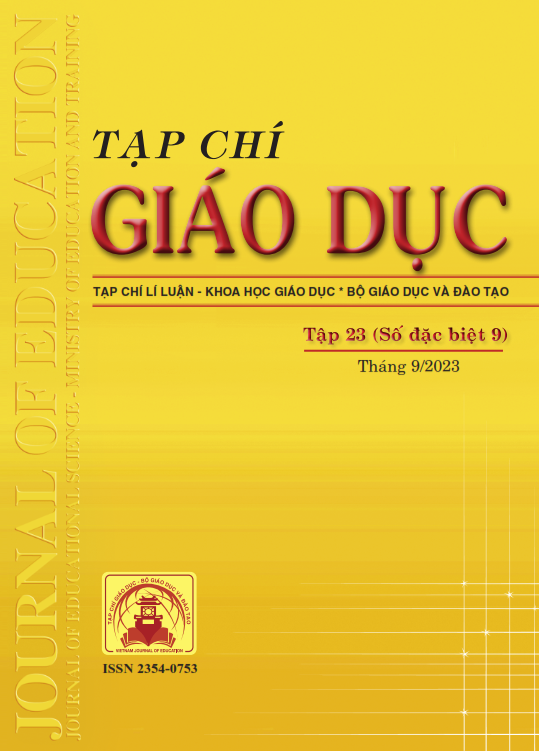Đánh giá hệ thống đào tạo trực tuyến tại Trường Đại học Nguyễn Tất Thành: quan điểm của sinh viên và giảng viên
Tóm tắt
Over the years, online learning has undergone significant growth and integration within the education system in Vietnam, leading to the necessity of evaluating its efficacy and implications for institutions such as Nguyen Tat Thanh University. This qualitative study aims to assess the current state of online learning at Nguyen Tat Thanh University through surveys conducted with 170 undergraduate students and in-depth interviews conducted with 10 educators. The study is centered around two primary objectives: 1) evaluating the students' perspectives on the current state of the online learning system at Nguyen Tat Thanh University, and 2) Evaluating the features of the LMS software in the online learning system from the perspective of educators at Nguyen Tat Thanh University. The findings reveal that although the online learning system at Nguyen Tat Thanh University has enhanced training activities, there are still limitations in its management that exert influence upon learning effectiveness. The study intends to contribute to the enhancement and optimization of the efficacy of the online learning system at Nguyen Tat Thanh University, as well as to advance our understanding of online learning management and its impact on educational outcomes.
Tài liệu tham khảo
Almusharraf, N., & Khahro, S. (2020). Students satisfaction with online learning experiences during the COVID-19 pandemic. International Journal of Emerging Technologies in Learning (iJET), 15(21), 246-267. https://doi.org/10.3991/ijet.v15i21.15647
Aparicio, M., Bacao, F., & Oliveira, T. (2016). Analyzing the relationship between LMS usage and users' performance in higher education. Computers in Human Behavior, 56, 186-196.
Bagarukayo, E., & Kalema, B. (2015). Evaluation of E-Learning usage in South African universities: A critical review. International Journal of Education and Development using Information and Communication Technology (IJEDICT), 11(2), 168-183.
Crews, T. (2015). E-Learning readiness perceptions of teachers in the school district of Pickens County. South Carolina (Doctoral dissertation, Clemson University).
Georgakopoulos, I., Chalikias, M., Zakopoulos, V., & Kossieri, E. (2020). Identifying Factors of Students” Failure in Blended Courses by Analyzing Students” Engagement Data. Educ. Sci., 10(9), 242. https://doi.org/10.3390/educsci10090242
Kentnor, H. E. (2015). Distance education and the evolution of online learning in the United States. Curriculum and Teaching Dialogue, 17(1), 21-34.
Luu, A. (2019). Giáo dục đại học Việt Nam trong bối cảnh cuộc Cách mạng công nghiệp lần thứ tư. Tạp chí Khoa học xã hội, 6(3), 65-67.
Saeed, N. (2020). Teachers’ perceptions on the use of blended. https://darius.hbu.edu/bitstream/handle/20.500.12262/229/Saeed_hbu_1962D_10045.pdf?sequence=1&isAllowed=y
Nguyen, H. T., Nguyen, T. H., & Nguyen, T. T. H. (2020). Online learning: The current status of its usage by students and faculty members in Vietnam. Journal of Educational Science and Technology, 6(2), 141-150.
Rodrigues, H., Almeida, A., & Amaral, L. (2019). Digital learning environments in higher education: A literature review of the role of teachers and students. Computers in Human Behavior, 92, 90-102.
Sangra, A., Vlachopoulos, D., & Cabrera, N. (2012). Building an inclusive definition of e-learning: An approach to the conceptual framework. The International Review of Research in Open and Distributed Learning, 13(2), 145-159.
Tawalbeh, T. (2018). EFL Instructors” Perceptions of Blackboard Learning Management System (LMS) at University Level. English Language Teaching, 11(1). https://doi.org/10.5539/elt.v11n1p1
Tran, T., & Bui, H., (2020). Quản lí dạy học trực tuyến trong các trường đại học kĩ thuật tại Thành phố Hồ Chí Minh. Tạp chí Khoa học Đại học Mở Thành phố Hồ Chí Minh, 15(1), 51-59.
Tucker, R. C., Wycoff, T., & Green, T. J. (2017). Blended learning in action: A practical guide toward sustainable change. Thousand Oaks, CA: Corwin.
Đã Xuất bản
Cách trích dẫn
Số
Chuyên mục
Giấy phép

Tác phẩm này được cấp phép theo Ghi nhận tác giả của Creative Commons Giấy phép quốc tế 4.0 .












